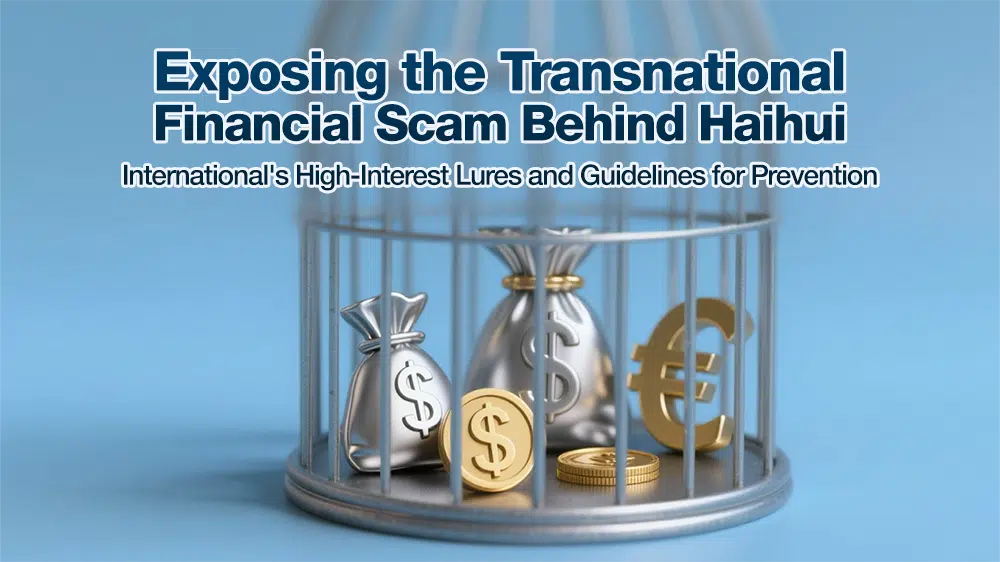Exposing the Transnational Financial Scam Behind “Haihui International’s” High-Interest Lures and a Guide to Prevention
Financial scams are becoming increasingly complex, posing a severe challenge to personal wealth. The recent exposure of the “Haihui International” (DRC) pyramid scheme is a large-scale financial crime case with a wide impact and enormous sums of money involved. This case spans multiple countries and regions, affecting hundreds of thousands of victims, and once again sounds the alarm for financial security.
The True Face of Haihui International: A Pyramid Scheme in Disguise
The core of the “Haihui International” scam was its dual-layer deception model. The group established the “Haihui International” (later renamed DRC) platform under the guise of “managed forex trading” to create a false image of legitimacy and professionalism. The initial lure was the highly attractive promise of “high returns.” Taiwanese police reported that the group used a “60% annual interest rate” as bait for illegal fundraising.
However, the actual operating model of “Haihui International” was a typical “pyramid scheme.” Its core was a “head-hunting” mechanism, where participants’ earnings were primarily based on the number of downline members they recruited and the amount of their deposits. This model exploited the “social proof” effect of recommendations from acquaintances, causing victims to lower their guard and unwittingly become promoters of the scam.
In-Depth Analysis of Scam Tactics: High Returns and the “Recruitment” Model
The scam tactics of “Haihui International” were a composite of various classic fraudulent elements.
First, the illusion of high returns was its core bait, promising an “annual interest rate of 60%,” far exceeding legitimate investment returns, a typical feature of a Ponzi scheme.
Second, the pyramid scheme engine of “recruitment” was key to its rapid expansion. Although it appeared to be managed forex trading, it was actually based on a “recruitment” model, where participants’ income was directly linked to the number of downlines developed and the team’s total deposits.
To grow quickly, the group employed complex promotional and organizational methods, including online promotion, offline courses, and seminars. These offline gatherings and “broker” direct referral models created a sense of community. Through “brainwashing-style” training and peer pressure, members became deeply invested financially, emotionally, and socially, making it difficult to leave.
Furthermore, the group adopted strategies to evade investigation, once changing its name from “Haihui International” to “DRC” to continue operations. Such name changes are a common tactic used by fraudsters to shed a negative reputation and confuse law enforcement.
Analysis of “Haihui International” Scam Tactics
| Scam Tactic | Specific Description | Key Warning |
| Platform Setup and Disguise | Set up the “Haihui International” (DRC) platform to conduct fraudulent activities under the guise of “managed forex trading.” | Be wary of platforms claiming to offer high-return managed forex services; always verify their regulatory status and the authenticity of their business model. |
| High-Return Bait | Promised unreasonably high returns, such as an “annual interest rate of 60%,” far exceeding average market levels. | Any investment promising “unreasonably high” and “guaranteed” returns is likely a scam; compare it with average market return rates and risk levels. |
| Pyramid Scheme Model | Used a “recruitment” method to develop downlines, with compensation or rebates based on the number of people recruited and the team’s total deposits. | Projects where income is primarily derived from recruiting new members rather than actual business or investment returns are a classic feature of pyramid schemes; be cautious of opportunities that overemphasize recruitment. |
| Promotional and Organizational Methods | Promoted through online advertising, offline classes, and direct referrals by “brokers.” | Be wary of investment projects that overemphasize “community,” “personal referrals,” or involve brainwashing-style training and group activities; also be cautious of investment invitations from acquaintances. |
| Evasion of Investigation | To evade investigation, the group changed its name to “DRC” to continue operations. | Platforms that frequently change their name, have non-transparent website information, untraceable history, or lack proper registration information should be highly suspected of their legitimacy. |
A Shocking Scale of Victimization: A Financial Catastrophe Sweeping Multiple Regions
The scale of the “Haihui International” scam was astounding, with its reach extending over a wide geographical area, involving multiple provinces and cities in China, Hong Kong, Macau, Taiwan, and some Southeast Asian countries. This transnational operation exploited regulatory differences in various locations, increasing the difficulty of cracking down on it.
The scam had a massive number of members. As of September 27, 2021, it had developed 32 levels of members, with over 900,000 registered member accounts in mainland China. In Taiwan, it illegally raised over NT$800 million and recruited more than 20,000 members. Accompanying the huge number of victims were astronomical amounts of funds involved, totaling over 10 billion RMB.
The transnational nature of this case posed significant challenges for law enforcement and regulatory agencies, making asset recovery and bringing criminals to justice extremely complex. This also serves as a reminder to investors that a platform’s seemingly international presence may be a strategy to evade local regulations.
Cashback Island Reminds You: How to Identify and Prevent Investment Scams
The “Haihui International” case highlights the importance of proactively identifying and preventing investment scams. Here are key prevention guidelines from Cashback Island for you.
Point 1: Beware of “Unreasonably High Returns”
Any project that promises “high returns” with extremely low risk, or a rate of return significantly higher than the general market level (such as the 60% annual rate claimed by “Haihui International”), should be considered a major red flag. Always consult an independent financial advisor and question the source of the returns.
Point 2: Identify the Trap of the “Pyramid Scheme Model”
The core feature of a pyramid scheme is the “recruitment” mechanism, where income is primarily derived from recruiting new members and their investments, rather than from actual product sales or investment performance. The key is to determine if the main source of income is from recruiting new members.
Point 3: Scrutinize the Platform’s “Legitimacy and Transparency”
Verifying the regulatory status and operational transparency of an investment platform is crucial. “Haihui International” used the guise of “managed forex trading,” highlighting that investors must check if a platform is officially registered and regulated. Be wary of platforms that lack verifiable contact information and clear terms of service.
Point 4: Beware of “Frequent Name Changes” and “Lack of Transparency”
From the case of “Haihui International” changing its name to “DRC” to “evade investigation,” it is clear that investors should be highly suspicious of investment platforms that frequently change their names, websites, or operating entities, especially without a clear and reasonable explanation. A lack of transparent historical information is a major red flag for fraudsters.
Point 5: Pay Attention to “Official Announcements and Regulatory Information”
Official warnings and legal proceedings are reliable sources of information for identifying and preventing scams. For example, the research materials mentioned “announcements from the Hengyang Public Security Bureau and the Hengyang Intermediate People’s Court.” Investors should regularly check the official websites of government and financial regulatory agencies for fraud alerts and blacklists.
Latest Case Developments and Legal Sanctions: Justice May Be Slow, But It Arrives
Although investigations into large-scale transnational financial scams are complex, the progress in the “Haihui International” case shows that the law will eventually punish the wrongdoers.
The head of the “Haihui International” pyramid scheme in mainland China, a person surnamed Liu, was arrested on July 16, 2025, marking a significant breakthrough in the investigation. At the judicial level, as of July 12, 2025, the Hengyang court had accepted 109 first-instance cases involving 191 people in the “Haihui International” pyramid scheme series. All cases have been tried and sentenced, with 107 cases involving 180 people having taken effect.
However, the case timeline also reveals a significant time lag between the active period of the fraudulent activity and the completion of legal action. For instance, the scam had accumulated a large number of members by September 2021, while the legal resolution was largely completed around 2025. This highlights the critical importance of proactive public education and personal prevention strategies.
Conclusion: Protecting Your Wealth Starts with Vigilance
The “Haihui International” scam is a painful lesson, reminding us that vigilance and knowledge are the shields that protect our wealth. The dangers of unrealistic promises of high returns and the “recruitment” pyramid scheme model are clearly visible. Every investment decision must be based on thorough due diligence and critical thinking.
Financial security is the shared responsibility of every investor. In the face of evolving financial threats, proactive vigilance and continuous learning are our strongest defenses. Fraudsters constantly adapt their methods, as seen with “Haihui International” evading investigation by changing its name, which means financial education must be an ongoing process.
We encourage all users to actively report any suspicious investment opportunities to the relevant authorities. Cashback Island is committed to being a trusted partner in your financial journey and urges you to regularly use the “Scam Alerts” section and other educational resources on our platform to enhance your protective capabilities.
Protecting your hard-earned money starts with being vigilant now. Through wise decisions, continuous awareness, and a commitment to financial literacy, let’s build an impenetrable line of defense together.
Cashback Island exposes multiple scam cases every month. Traders can browse the “Cashback Island Scam Alerts” in real-time to avoid falling into new financial traps.
Related Articles
-
Major investment fraud incidents have recently occurred in Hong Kong, with two cases resulting in a total loss of nearly 24 million HKD. One business person was deceived by a fake stock investment platform, losing over 19 million HKD within four months, setting a record for the largest single online...2025 年 10 月 11 日
-
Police in India's Sri Ganganagar district recently dismantled a major financial investment scam, arresting eight suspects involved in fraudulent activities through cryptocurrency and foreign exchange trading platforms. The group lured over 5,000 investors with promises of guaranteed profits, illegally amassing 210 million rupees (approximately $2.42 million) over an 18-month operation....2025 年 10 月 11 日
-
In the internet age, everyone dreams of getting rich quick, but beware, this could make you an easy target for investment scam syndicates. Slogans that boast "guaranteed profits" and "no-risk returns" are often one-way tickets to losing everything. A recent real-life case in Malaysia brutally reveals just how terrifying these...2025 年 10 月 11 日












